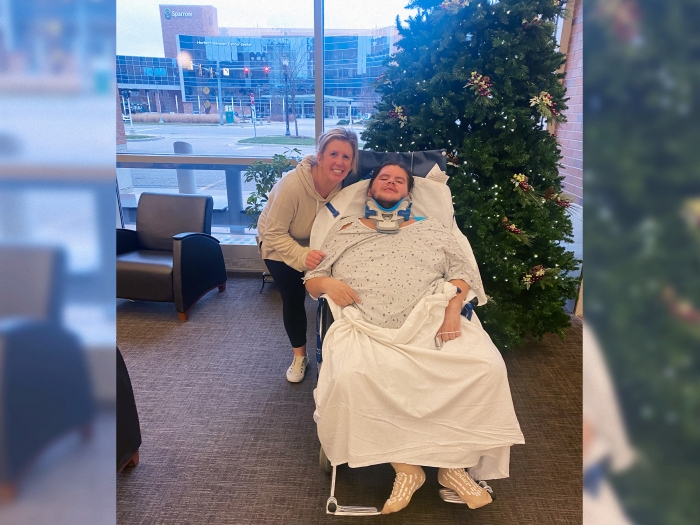New approval for Medicare’s Acute Hospital Care at Home program adds to programs for COVID-19 patients and others
Author |
Since last summer, hundreds of Michigan Medicine hospital patients have continued to receive high-quality, innovative care at home, with the help of skilled teams and remote-monitoring technology.
For COVID-19 patients, and many others with complex conditions, this has meant shorter hospital stays, more support after a hospital stay or even avoiding hospitalization.
Now, a new approval from the federal agency that oversees Medicare means more patients will soon have this option, if their care teams feel they’re ready for home-based, hospital-level care.
Michigan Medicine is the first hospital in Michigan to be accepted into the Acute Hospital Care at Home program of the federal Centers for Medicare and Medicaid Services.
The approval means the Post-Acute Care Services team at the University of Michigan’s academic medical center will expand its services to prepare to accept people covered by traditional Medicare. The first patients may be enrolled by spring.
Expanding options
The new program joins a COVID Completion at Home program launched in fall 2020 that has helped dozens of patients with the disease leave the hospital and continue their COVID-19 recovery at home. Many of these patients have other conditions that make their recovery especially complex.
Meanwhile, Michigan Medicine’s flagship program, called Patient Monitoring at Home, has helped hundreds more, with a wide range of conditions. It’s funded in part by a grant from the Federal Communications Commission’s COVID-19 Telehealth Program. More than 100 patients are enrolled at any given time.
A fourth program is a pilot by Blue Cross Blue Shield of Michigan, which has just expanded to accept even more people who live near Michigan Medicine’s flagship University Hospital. The Hospital Care at Home program is designed to enroll patients from the emergency department whose condition qualifies for an inpatient stay, and instead transition them home to receive hospital-level care and monitoring there. It can now accept patients with any diagnosis, and multiple types of BCBSM insurance including Medicare Advantage.
All of the programs offer a level of in-home and remote care that goes beyond traditional home health care to support patients with ongoing needs – although Michigan Medicine offers that type of care too.
For hospital-level care, physicians, nurse practitioners, nurses, paramedics and remote-monitoring teams work together to examine patients, keep close watch over the data generated by the kit of home-monitoring tools that monitor blood pressure, oxygen levels and other vital signs. Rapid response capabilities ensure patients who need to go to the hospital reach it quickly.
The new CMS program requires reporting of data to the federal government, and Michigan Medicine’s team is doing its own evaluation of the effects of the other programs.
“The pandemic has driven the desire by patients to be at home whenever possible, and the need for hospitals to innovate in expanding our ability to care for patients with COVID-19 and those without,” says Grace Jenq, M.D., a geriatrics specialist and associate chief clinical officer for post-acute care at Michigan Medicine. “But we take great care to ensure that each patient who receives care under these programs can do so safely, and with the help of our skilled team members and partners.”
Those partners include the Huron Valley Ambulance service of Emergent Health Partners, Health Recovery Solutions, TridentCare for mobile diagnostics and Advanced Medical Solutions, Inc. for medical equipment.
Jenq notes that each program has taken a broad-based effort to develop and launch, because home-based hospital-level care is still new to many providers and payors. She credits staff across the post-acute care division, including those in Michigan Visiting Nurses, HouseCalls, and the HomeMed infusion and pharmacy program, as well as the hospital-based providers who have identified patients who might qualify.
Original announcement of Patient Monitoring at Home and Hospital Care at Home

Department of Communication at Michigan Medicine





